The hypercar maker who was told to give up his dream
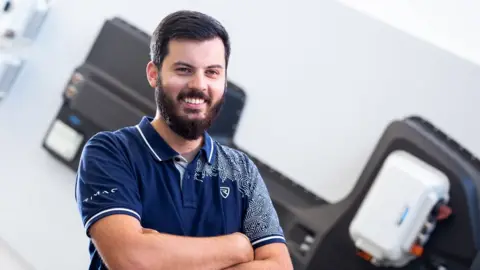 Rimac
RimacMate Rimac runs an electric car company that sells some of the most exotic machines on the planet - but it all started out with a decidedly unexotic old banger.
Using parts from a forklift truck truck he converted an elderly BMW saloon - dubbed the Green Monster - into a testbed for the electric technology he was developing.
The converted BMW then went on to compete in motorsport events - and win against conventionally-powered machines. For a time it was the world's fastest electric vehicle.
Two years later in 2009 he set up his company. "I wanted to build a car, that's all I wanted to do," he says.
It's fair to say that Mr Rimac is not your average motor industry executive
The bearded, sharply dressed 33-year-old might fit in better among the start-up glitterati of Silicon Valley. In fact, he regularly attracts comparisons with Tesla's Elon Musk.
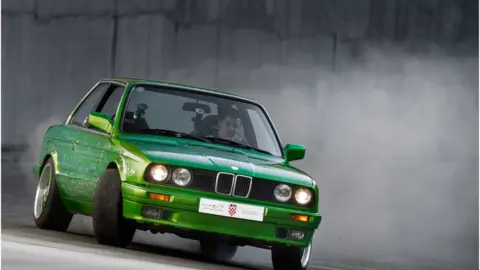 Rimac
RimacHowever, he has turned his back on California in favour of his native Croatia. His company Rimac Automobili is based in Sveta Nedelja, a small town outside the capital Zagreb.
Yet the technology and know-how developed there is rapidly finding favour with established manufacturers.
Rimac Automobili is best known for building ultra-exclusive electric hypercars.
The Concept One, first unveiled in 2011, had a top speed of 354km/h (220mph). Only eight were ever made - and one was famously destroyed when the TV presenter Richard Hammond careered off the road during a competition in Switzerland.
Its successor the C_Two is even more extreme with a claimed top speed of 415km/h (258mph); able to accelerate from 0-97km/h (60mph) in 1.85 seconds. Due to go on sale this year, it's expected to have a price tag of €2m ($2.4m; £1.8m).
The cars are by any normal measure extraordinary. But they form only one part of Rimac's business model. Increasingly the company is setting itself up as a technology supplier to other manufacturers, to help them build their own high-performance electric cars.
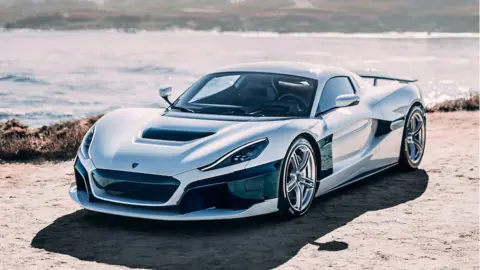 Rimac
Rimac"Because we didn't have the investors on board we had to make revenue from day one," he explains.
"That's when when we realised people don't want to invest in a boutique hypercar company, they want to invest in a scaleable business."
By supplying technology and expertise to other manufacturers, he says, he was able to create a source of funding that could sustain itself and grow.
One thing Mate Rimac has in common with many of the entrepreneurs of Silicon Valley is that he started out working in his garage.
In his case though, rather than developing a website he built his electric Green Monster.
The next step was to design a brand new car. But establishing an automotive business in Croatia was to prove a steep challenge.


"I couldn't hire anyone who did anything with cars," he remembers. "I went to the University of Zagreb and told them I wanted to build a car.
"They told me it wasn't possible to build a car in Croatia and said 'the sooner you give up the fewer people will go under with you'."
Nor was he able to tap into the funding networks of Silicon Valley.
"I went to Silicon Valley only once to ask for money, to talk with investors," he says.
"They were totally uninterested. This was eight years ago when electric cars were not hot. They were just investing in social media, they didn't want to touch electric cars.
"Today it's totally the other way round. All of them are investing huge amounts of money into electric cars based on the success of Tesla."
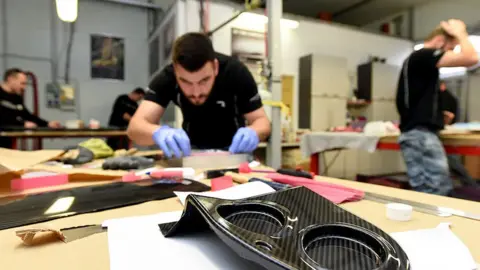 Getty Images
Getty ImagesNevertheless he did find powerful backing. In early 2018 the German sportscar manufacturer Porsche took a 10% stake, which it later increased to 15.5%.
This came at a time when Porsche's parent company, the Volkswagen Group, had already begun ploughing tens of billions of euros into its own electric car technology.
But Porsche, which was developing its own electric sportscar, wanted to tap into Rimac's specific expertise in designing high-performance battery and drive systems.
"He started developing electric vehicles years before we did," explains Porsche's deputy chairman and finance director, Lutz Meschke.
"Our investment has proven to be the right one. The value of the company has increased many times over since we joined. In addition, [it] has developed very well in terms of technology."
Two other car companies have also come on board. In May 2019 the Korean manufacturer Hyundai and sister firm Kia together agreed to invest €80m.
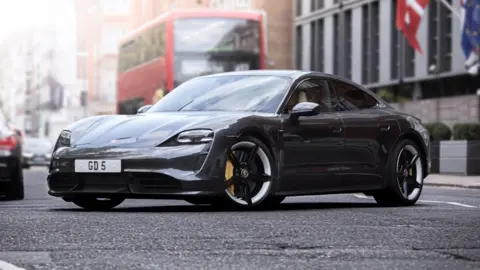 Getty Images
Getty ImagesFor their money, they acquired an unspecified stake in Rimac - as well as a technical partnership. It is now working with both companies to help them develop new electric vehicles.
According to independent automotive analyst Matthias Schmidt, the way in which governments are trying to phase out conventional petrol and diesel cars presents a big opportunity for the Croatian firm.
"Car companies are effectively being forced to develop electric cars," he explains.
"The really big ones like Volkswagen and Stellantis can do it. But the middle-ranking ones just don't have the funds to do it themselves, so they have little option but to buy the technology from elsewhere."
Meanwhile, David Bailey professor of industrial strategy at Birmingham University, believes the car making business itself could still make money.
"Mate Rimac is seen as a real disruptor," he explains.
"His company has come from absolutely nowhere, their products are really exciting - and they've developed a brand round the hypercars."
He believes that brand could now be used to sell electric supercars - machines that can sell for hundreds of thousands of dollars, rather than millions.
"The technology is developing so fast, I think there's a real role for Rimac to play here.
"I think that could prove quite lucrative."
